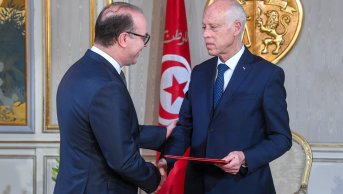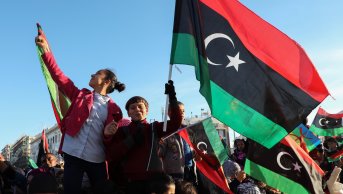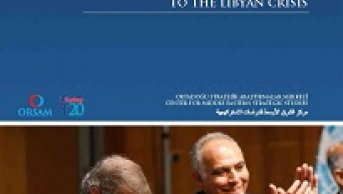Egypt's Deadlock in a Zero-Sum Game

There are no signs that the parties of the conflict in Egypt will accept a quick political solution that can end the deadlock in the country.
After the political scene changed following the June 30 protests, the tension in Egypt has not eased during the past six-week period that started on July 3, when the coup took place, but has increasingly continued.
The fact that many members and senior officials from the Muslim Brotherhood (MB) and the Freedom and Justice Party (FJP) have been arrested and their financial assets frozen in the post-June 3 period did not stop the anti-coup demonstrations, who are calling for the release and reinstatement of Mohammed Morsi as president.
While the FJP has not reached a compromise on the roadmap imposed by the army, it persisted in refusing to end ongoing sit-ins as well. Despite the widespread view that the MB has been trying to strengthen its hand before starting the negotiations by carrying on the demonstrations ceaselessly for the past month, it seems that this view will remain a hypothesis until the beginning of negotiations. It should also be noted that such a strategy has a lot of risks not only for the MB but also for the country.
The same is the case for the Egyptian army. On July 24, the statement of Gen. Abdel Fattah el-Sisi, head of the Egyptian Armed Forces and minister of defense, saying that “no one should expect us to withdraw,” is important since it clearly shows the Egyptian army's stance.
Above all, both parties interpret the choice of compromise as “weakness” under the current circumstances, and endeavor to make the other party take a step back. It is thus understood that all parties in Egypt have regarded the current crisis as a “zero-sum” game, which has also been affected by the current political crisis and environment of instability of the past few weeks. Also, the developments that have taken place within the past weeks have affirmed these arguments.
The passing of time for both actors increases the cost of withdrawal and nourishes the understanding of a zero-sum fight that prevents solving the political crisis. The dissolution of parliament and the ousting of the president led to the elimination of institutional channels that could be used for compromise. The Egyptian army envisaged those implementations would weaken the MB and be enough to include them in the negotiations, but this came to naught, and we clearly see the signs that it will turn towards more comprehensive and harsher implementations.
Transition of Egyption army
The Egyptian army has been in a wide transition since Feb. 11, 2011. Contrary to the expectations and allegations put forward by optimistic approaches in the past three years, this transition process has brought the Egyptian army into a stronger and more efficient position in Egyptian politics than it had in the past, and this position has become even stronger for now and has generally been consolidated.
On Feb. 11, 2011, when Omar Suleiman declared that Hosni Mubarak had resigned as president and “handed over” power to the Supreme Council of the Armed Forces, it brought great happiness in advance both in the streets of Egypt and also in world public opinion, as they believed it was a “big revolution.” Then, the happiness led to great optimism after Morsi forced the top generals of the Supreme Council of the Armed Forces to retire right after the “judicial coup.” The optimism mainly resulted from the passive image of the Egyptian army, which withdrew from politics and was not directly involved in the transition process, underlying the crisis of the judicial coup that took place following the presidential elections. However, it became clear in the July 3 coup that the optimistic approach does not correspond to real politics.
The army in Egypt has redefined itself in a “supra-political” position over the past three years. The Egyptian army, which was one of the partners, or mentors, in other words, of the regime until 2011, was positioned not as a party in the political arena in the post-Mubarak period but as the only tutelary patron.
The Egyptian army had directly been within the authoritarian regime since 1952, namely, since the Free Officers established the republic in Egypt after toppling the king. The fact that all presidents of the state so far have been from the army clearly puts forward this relationship. However, the authoritarian regime in Egypt differs from the traditional military regimes that only focus on military bureaucracy.
A regime that is composed of quite a strong civilian bureaucracy besides a military bureaucracy, in which the state is both patron and party, describes the regime of the pre-2011 Egypt much better.
Changes to "state-party" as an entity
In the post-2011 period, on the other hand, the state-party unification disappeared. Especially the distribution of unearned income through the party, which can be considered the most important pillar of the patron-state, and the political sphere dominated by a single party came to an end. However, while the authoritarian state structure was not demolished, it is in the process of restructuring and repositioning itself in line with those changes. The most successful actor during this transition process has been the Egyptian army. This period can be reviewed in three periods: revision, repositioning and consolidation.
The first period, revision, covers the process between Feb. 11, 2011, and August 2012 -- namely, the period between the resignation of Mubarak and Morsi's forcing a considerable number of high-ranking generals, along with the head of Egypt's Supreme Council of the Armed Forces, Gen. Mohammed Hussein Tantawi, to resign. The most important characteristic of this period is the fact that the transition started under the control of the Egyptian army.
One of the most important developments during the controlled transition process is the dissolution of the former ruling party, the National Democratic Party (NDP), on April 16, 2011. Thus, the Egyptian army showed that it would reshape the future of Egypt over other foundations than the party-state tradition. But it would be wrong to assert that those new foundations are based on democratic principles.
What the Egyptian army endeavored to do, especially in the first period, was to sacrifice some institutions becoming idle in order to protect the future of the authoritarian regime and the state, and to restructure authoritarianism in order to reach a new social agreement between the society, the authoritarian regime and the state. While a radical transition was not among these objectives, the most important reason why the Egyptian army forced Mubarak to resign was to prevent the possibility of a radical transition.
Especially the fact that the current constitution remained in force as the result of the 2011 constitutional referendum with the support of the MB and the Salafis without being revised strengthened the hand of the Egyptian army on the one hand and led to a disguised and loose alliance between military Islamists on the other. However, as is seen, the alliance ended in the first major crisis since it was not based on long-term interests.
The election-peace illusion
The most important consequence of the revision period was the image of an authoritarian regime by making artificial and cosmetic changes. Through this cosmetic change, institutions of the authoritarian regime gained time to gather strength, rather than becoming weak. Institutional reforms were not made in judicial, security and intelligence institutions, as well as other state institutions; what is more, even senior officials did not leave their seats.
Another important characteristic of this period is that an illusion, promising that the elections would pave the way for a legal and peaceful political environment based on consensus under former legislation and regulations in the country, was created. The fact that a provisional constitution, electoral law and civil society law were not enacted during the revision period led to the transition ending up in favor of authoritarian structuring. All in all, status quo tendencies, institutions and laws shaped the revision period.
The second period of the transition process started with the presidential elections, judicial coup and Morsi forcing a considerable number of high-ranking generals, along with the head of Egypt's Supreme Council of the Armed Forces, Gen. Tantawi, to resign. The army was no longer the actor of the first period, especially after the high-ranking generals were forced to resign, and began to redefine itself in a supra-political position. For instance, the army did not resist Morsi's decision for the elimination of high-ranking generals and Tantawi, and that caused a perception that the army was growing weak. But, in fact, the army was not excluded from the process; on the contrary, it continued to shape the transition as an actor in the shadow.
The gains of the army during the Mubarak period were guaranteed in Egypt's new constitution, which is currently postponed and planned to be revised. In addition to the assurances that make it possible for the military bureaucracy to expand towards the civilian sphere such as civilians being tried in military courts, the constitution paved the way for the Egyptian army forming three commissions, and thus also made it institutional.
Army was behind scenes
Even though the MB, the FJP, Salafi parties and opposition parties come to the forefront in the repositioning period, the dominant actor of this period is the loose alliance between the army and Islamists. While this alliance narrows the realm of activity of Islamists, namely the MB and the Salafis, it also served to create an understanding that the army also agreed to change and for the army to have major gains in basic laws. Furthermore, the army's presence behind the scenes put all the responsibility of the main problems and crises in the country on Morsi and his cabinet.
During the same period, the army remained behind the scenes and repositioned itself in the politics and economy of the country. After Morsi came to power, the Egyptian army's position went through a transition from being a “side” in politics into a supra-political “regulatory” status. The MB and the Salafis couldn't resist this situation, and implicitly accepted it.
The third period, which started with the coup staged on Aug. 3, points out the stage where the opposition also recognized and consolidated the supra-political status of the army. At this point, it is indisputable that the playmaker in Egyptian politics is the Egyptian army. This situation might be forced to change through the push of a large pro-change civilian alliance in the long term. However, in the short and medium term, the Egyptian army became both a designated authority to apply in political and economic deadlock, and also the highest authority defining the boundaries in political, economic and social fields.
Hence, the Egyptian army has volunteered to give up its position, which changed in the past three years. It became more obvious after the bloody operations on July 26-27 that the army may take the risks of using radical steps that might cost a high price, because strategically the Egyptian army has observed stepping back as a catastrophic defeat that may endanger its supra-national position in the country's economic and political life.
Sisi's new target
Unsurprisingly, Sisi's July 24 televised speech highlighted that the army is ready to declare any actor in Egypt a national security threat when their actions threaten the interests of the army itself. On July 24, Sisi urged Egyptians to take to the streets on Friday, July 26, against “violence” and “terrorism.” Demanding street support for the “fight against terrorism,” which is legally the duty of the army, indicates that the target is beyond the fight against terrorism.
Especially for the past weeks, the broadcasts of the Egyptian media have been given with visuals and emphasis on arms and conflict. The Muslim Brotherhood forming troops to maintain security in protest squares, news and images of protesters carrying arms, and conflict between civilians have been predominantly seen in the media. Therefore, it wouldn't be wrong to suggest that the media has been psychologically trying to create the perception of terrorism.
In turn, it might be asserted that it has been successful in creating “terrorism, suspicion and hatred” in the country. For instance, the Egyptian media have made broadcasts accusing Syrian refugees in Egypt in recent weeks. In those broadcasts, with Syrian refugees supporting anti-coup actions, it seems the “spy and foreign power” accusations have frequently been emphasized. In parallel with this situation, many attacks have been carried out against Syrian refugees across the country.
A similar situation is also the case for Palestinians and Hamas in particular. The song of a Palestinian singer supporting Morsi also endorses the discourse of “foreign powers and spies.” The fact that Morsi is charged with sharing official secrets with Hamas is the most obvious example in terms of the “terrorism” perception.
Authoritarian regimes in the Middle East have used such strategies, based on foreign plots, in the past and today to suppress the opposition successfully. In general, the rhetoric of foreign agencies' plots and terrorism sustain the support of the indecisive masses -- at least they sustain a further opposition to the repression, as well as the rhetoric of “solidarity successfully prevents the opposition and further demands."
This strategy, so far, has been isolated to the Muslim Brotherhood and left alone in the streets for now. Till now, several initiatives have been proposed by political groups to resolve the crisis, yet all these were rejected by the Brotherhood. They insist on the return of Morsi, the “legitimate president,” to power as a precondition for negotiations. Through the power mobilized in the streets, the Muslim Brotherhood aims to push back the army. Since it can still mobilize millions of its supporters across Egypt, street politics has been chosen as the most viable strategy for the Muslim Brotherhood so far.
The peaceful resolution of the ongoing conflict in Egypt can be achieved by changing the perception of the parties that base it on a zero-sum game. As long as the parties continue to see the struggle as win-or-lose all, reconciliation will mean weakness or, more dramatically, be a matter of survival.












